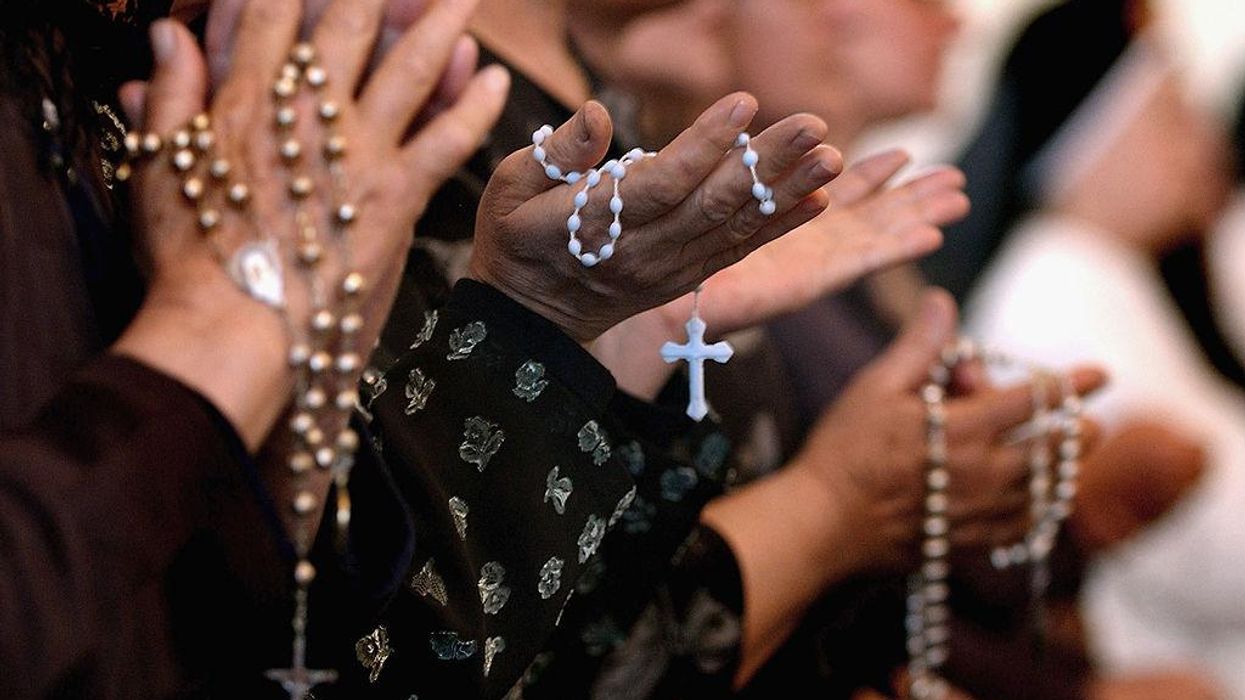
Photo by Wathiq Khuzaie/Getty Images

Though American Catholics — who constitute approximately 25% of the population — may regard the rosary as a set of prayers in honor of the Virgin Mary that can be tracked on a string of knots or beads, according to an article published by the Atlantic on August 14, it has "become an extremist symbol."
That was the direct accusation as it first appeared in the title of a piece: "How the Rosary Became an Extremist Symbol," written by Daniel Panneton, an "anti-hate researcher" based in Toronto. While the article's original title exists as a virtual artifact in the article's URL on other sites, it has since been modified on the Atlantic's page to read: "How Extremist Gun Culture Is Trying to Co-Opt the Rosary." Though the title has changed, the content remains the same.
Like the AR-15 rifle, which "has become a sacred object for Christian nationalists," Panneton wrote that "the rosary has acquired a militaristic meaning for radical-traditional (or 'rad trad') Catholics." The rosary, he suggested, is believed by an "extremist fringe" to be "a weapon in the fight against evil."
Panneton conceded that there is mainstream and historic precedent for the association of the rosary with militaristic themes. He noted that a commander of the pontifical Swiss Guard called a gift of rosaries "the most powerful weapon that exists on the market"; the rosary has long been regarded as "weapon against Satan"; and even Pope Francis spoke of the need for "spiritual combat." Nevertheless, he suggested that its association by conservative Americans is ultimately "rooted in fantasies of violently defending one's family and church from marauders."
Referring to "Deus Vult ('God wills it') crusader memes," Christian iconography paired with political rhetoric, and implorations online "for men to rise up and become Church Militants," Panneton argued that there has been a concerted effort to integrate "ultraconservative Catholicism with other aspects of online far-right culture." He insinuated further that this is not a matter of online trolling, but of "providing a pathway to radicalization and real-world terrorist attacks."
In the hands of so-called "ultraconservative Catholic[s]," Panneton believes the rosary to be "anything but holy."
Eric Sammons, editor of Crisis Magazine, responded, saying: "Of course, in our modern woke world all militaristic language has become politically incorrect." Sammons questioned the extremist label applied by Panneton to "rad trads," asserting that an aversion to LGBTQ acceptance in the Church, pro-life views, and opposition to transgenderism targeting children simply means the accused "act like Catholics."
Republican Rep. Lisa McClain (Mich.) suggested that Panneton's piece is emblematic of a broader hostility toward Christians from the left.
\u201cThe far left thinks the Rosary is an extremist symbol.\n\nThat just shows how radically anti-Christian they have become.\u201d— Lisa McClain (@Lisa McClain) 1660583216
On Monday, Fox's Rachel Campos-Duffy concurred with McClain, suggesting that this article is one among many "trying to associate people who are faithful, especially those who adhere to more orthodox or traditional interpretations of faith, as somehow being right-wing extremists, white nationalists, fringe."
Though some have taken to mocking the article, Campos-Duffy warned, "We shouldn't just laugh at the silliness of this. We should understand that in this country and around the world, Christianity and faith in general is under attack. ... We should be very protective of our religious liberties and push back against this kind of bigotry against Christians."